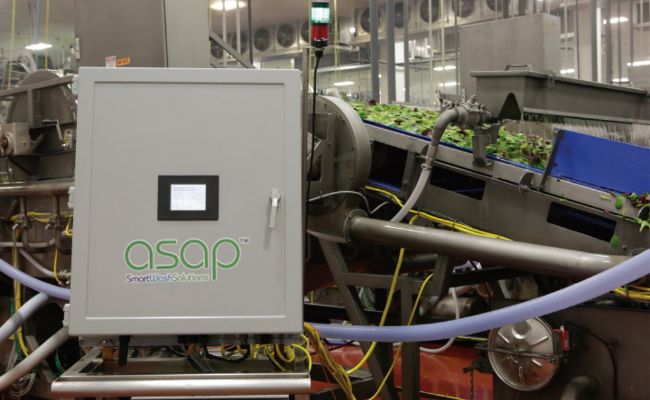SmartWash Solutions® – an industry leader in food safety science, engineering, and technology – celebrates its fifteenth year of innovations in fresh produce wash water monitoring, calibration, and control. The comprehensive system supports companies at over 30 facilities across Europe, North America, Asia, and Oceania, protecting over five billion pounds of produce annually.
“Our scientists and engineers ensure our products and innovations remain at the forefront of food safety prevention, detection, and management,” shared Steven Swarts, Director of Business Development for SmartWash Solutions. “For example, we initially launched our ASAP-unit as a pH control system managing the application of the SmartWash® food wash enhancer but soon recognized the industry’s need for chlorine management. Our team enhanced the machine into the complete monitoring and control system used today, continuously applying updates as food safety challenges evolve.”
The company’s innovations in chlorine monitoring and control have been critical for enhancing food safety in the European market. “Despite chlorine being recognized by the European Food Safety Authority (EFSA) as an effective food safety solution, many companies avoid its use due to consumer and regulatory concerns about chlorates residues, a disinfection by-product (DBP),” shared Ewoud Buter, General Manager for SmartWash Solutions’ European operations.
The Maximum Residual Level (MRL) for chlorates in leafy vegetables and herbs is 0,7 mg/kg. In recent European trials, the SmartWash Solutions chlorine wash system showed chlorate residues far below the Maximum Residual Level (MRL) for leafy vegetables and herbs, often as low as 0,02 mg/kg or even below detectable levels.
“The revolutionary SmartWash food wash enhancers paired with the dedicated calibration, extensive pH monitoring and control, and accurate data management the comprehensive system provides allows companies to use up to 10 times less chlorine than traditional systems by making the chlorine work more efficiently and effectively,” Buter added. “This results in chlorate residues at levels far below regulatory requirements, all while aligning perfectly with EFSA’s recommendations for optimizing chlorine wash systems. The system’s safety and compliance have also been validated by a study from the University of Ghent.
SmartWash Solutions’ comprehensive approach makes wash lines safer and more efficient, reducing input and labour costs, ensuring systems operate at peak efficiency, and providing real-time access to wash line data and reporting. Many partners, including OrganicGirl, Taylor Farms, and True Leaf, have experienced substantial business growth as a result of their collaboration with SmartWash Solutions.
Given the critical role of food safety in protecting consumer health and preserving brand reputations, SmartWash Solutions emphasizes long-term partnerships with stable pricing. “This model allows our partners to focus on maintaining safe operations without worrying about fluctuating market rates,” Swarts noted.
SmartWash Solutions is committed to continuous improvements and industry advancements. Company president Jim Brennan shared, “It has been an honour to serve on the Center for Produce Safety board for the past six years. We also share our wash water quality measurement data to improve food safety knowledge industry-wide and often donate use of our pilot plant facility to government and academic food safety researchers.”
Over the past fifteen years, the company has continued to revolutionize the food safety sector, filing nearly 100 patents globally, publishing seven journal articles, and partnering with key researchers including CEBAS and the University of Ghent in Europe and the USDA Agricultural Research Services (ARS) in the United States.
Looking forward, SmartWash has several innovations in customer trials, including a wash water management system and a new application for their SmartWash Boost™ line — known for its effectiveness in reducing pathogens up to 99,5%. Preliminary data indicates promising results, such as up to 5,58 log reduction in certain fruits like cantaloupes and peaches.
Source: SmartWash Solutions


